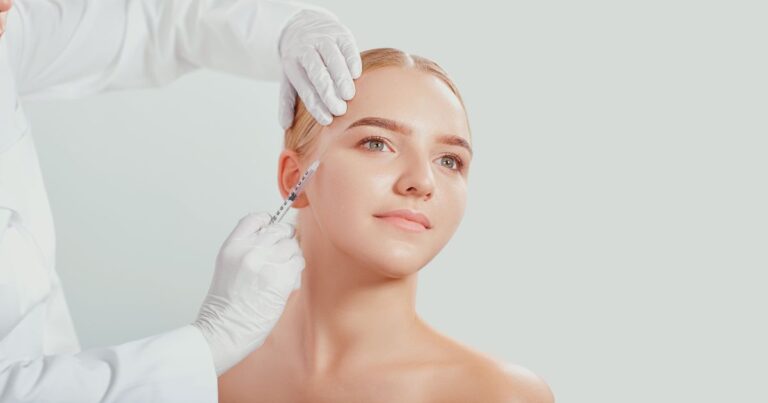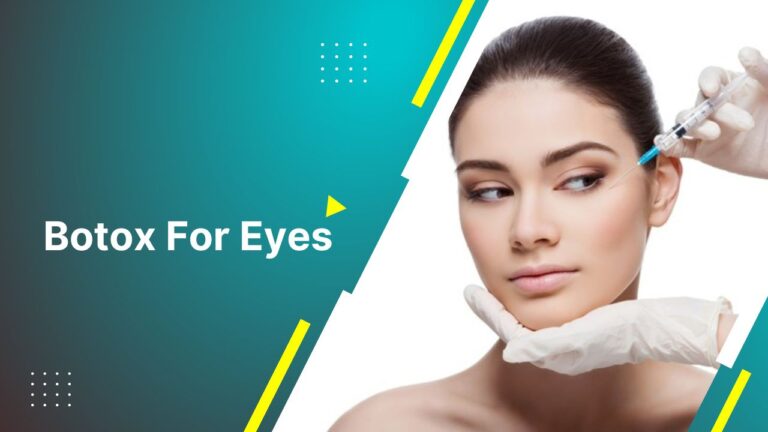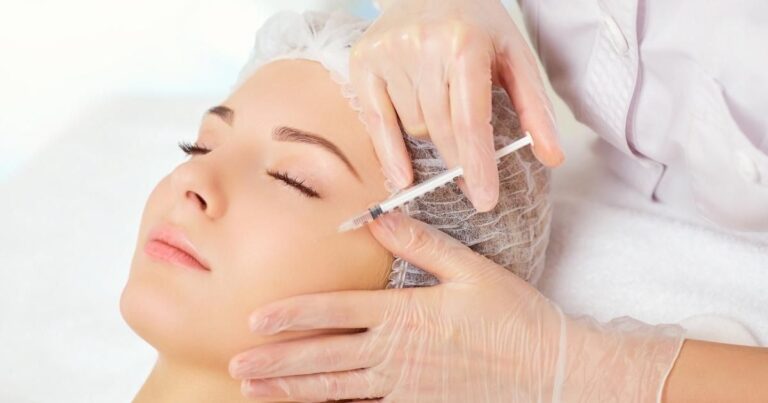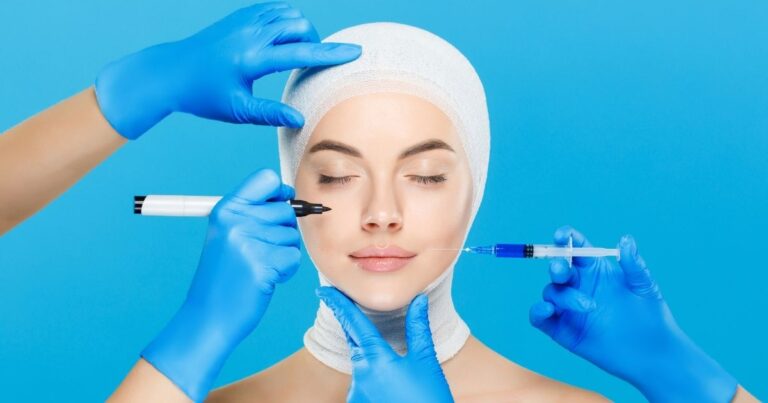Managing the time after a Botox procedure is essential to guarantee the effectiveness and safety of the therapy. One often-asked question is when it’s safe to resume exercising following Botox. This article thoroughly explains how soon after botox can you exercise by addressing essential elements, including professional guidelines, potential hazards, and customised advice.
The Importance of Knowing How Soon After Botox Can You Exercise
Adhering to post-botox exercise guidelines is crucial for ensuring the effectiveness of the treatment and minimising potential side effects. Failure to follow these recommendations can compromise the results, potentially leading to uneven muscle relaxation or quicker product dissipation. Strictly following a post-treatment regimen provides you the best chance for optimal, long-lasting results for Botox treatment.
| Aspect | Importance | Recommendation |
| Safety | High priority to avoid complications | Follow post-treatment guidelines |
| Optimal Results | Affects the effectiveness of the Botox | Stick to an aftercare regimen |
| Longevity | Prolongs the efficacy of the treatment | Follow the doctor’s recommendations |
| Reduced Side Effects | Minimises the risk of adverse reactions | Strictly adhere to guidelines |
| Investment | Maximises the value of your treatment | Ensure treatment lasts as intended |
| Peace of Mind | Provides reassurance that you are taking the right aftercare steps | Consult healthcare provider regularly |
General frame: When Most Doctors Recommend Resuming Exercise

Most healthcare providers generally recommend waiting at least 24 to 48 hours before resuming strenuous exercise. This timeframe allows the Botox to settle into the targeted muscles, ensuring effective results. Patients are often advised to stick to light activities, like walking, in the immediate aftermath of the treatment.
| Recommendation | Timeframe | Activity | Benefit | Risk of Ignoring | Expert Advice Level |
| Immediate | 0-6 hours | Rest | Allows initial settling of Botox | High | Strongly Advised |
| Short-term | 6-24 hours | Light walking | Gradual return to movement | Moderate | Advised |
| Common | 24-48 hours | Gentle exercises | Balances activity without risking results | Moderate-Low | Often Suggested |
| Extended | 48+ hours | Return to normal exercise | Ensures maximum Botox settling | Low | Case-by-case Basis |
| Individual | Varies | Custom based on individual | Tailored to personal recovery | Varies | Personalised |
| Special Cases | Case-specific | Adjusted based on treatment type | Addresses specific treatment nuances | Case-specific | Required |
Potential Risks of Exercising Too Soon After Botox
Exercising too soon after a Botox treatment can lead to unintended side effects such as swelling, bruising, or even product dispersal to unintended areas. Increased blood flow from exercise can interfere with the optimal settling of the Botox. As a result, patients may experience improved results.
| Risk | Description | Onset (If it Occurs) | Severity | Prevention Strategy | Recovery Timeline |
| Swelling and Bruising | Visible inflammation or discolouration of the treated area | Immediate to 12 hours | Mild | Rest and cold compress | 1-7 days |
| Product Migration | Botox moves to unintended muscle areas | 6-48 hours | Moderate | Avoid strenuous activities | Varies |
| Diminished Results | Reduced or no noticeable effect of Botox | 12 hours – 3 days | High | Follow post-treatment guidelines | May require re-treatment |
| Increased Blood Flow | Enhanced circulation potentially affects Botox’s settling | During Exercise | Moderate | Limit cardiovascular activities | Immediate after stopping exercise |
| Complications | Various side effects beyond normal | Varies | Varies | Adhere strictly to guidelines | Varies |
| Wasted Investment | Need for corrective treatments due to compromised results | 1 day – 1 week | High | Seek medical advice post-treatment | Varies |
How Can Exercise Affect Botox Results: Dispersion and Efficacy?
Physical exercise increases blood flow, potentially causing Botox to disperse more quickly and reducing its effectiveness. Elevated heart rates and increased perspiration may also disrupt the Botox’s ability to settle into the targeted muscles. Consequently, waiting the recommended period is crucial for achieving desired outcomes.
Book A Consultation With Dr Tarek Bayazid
Top-rated Plastic Surgeon For Botox in Dubai
Installment Plan Available
| Factor | Impact on Botox | Typical Exercises Causing Impact | Prevention Strategy | Impact Timeline | Notes |
| Blood Flow | Can disperse Botox | Cardiovascular workouts | Delay return to high-intensity exercise | Immediate during exercise | Especially during the first 24 hours |
| Heart Rate | Faster metabolisation | HIIT, Aerobics | Monitor and maintain a moderate heart rate | During exercise | Can vary between individuals |
| Muscle Contraction | Potential displacement | Weightlifting, resistance training | Avoid heavy weights initially | Immediate during exercise | Depending on the treatment area |
| Sweating | Altered pH levels | Intense workouts in hot environments | Stay cool and hydrated | During exercise | Excessive sweating to be avoided |
| Exercise Intensity | Rapid product use | Extreme sports or training | Gradual return to high-intensity activities | Varies based on exercise | Monitor closely post-treatment |
| Body Position | Botox migration risk | Certain yoga poses, pilates | Avoid downward head movements | During exercise | Especially in the first 24-48 hours |
Individual Factors: Why may the “Safe Period” Vary from Person to Person?
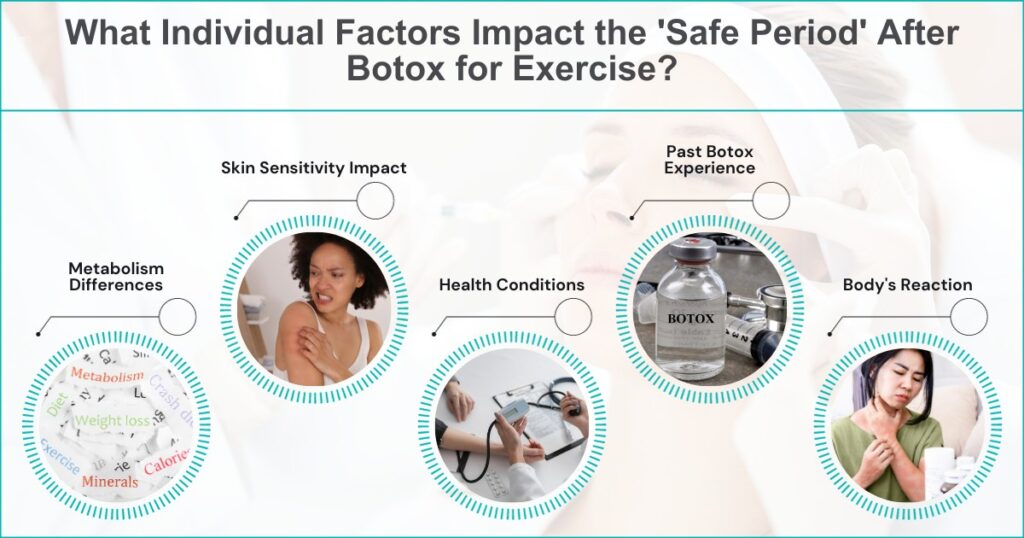
The recommended waiting period for exercise after Botox may vary due to individual factors such as metabolism, skin type, and overall health. Some patients might be cleared for exercise sooner than others based on their physiological response to Botox. It is essential to consult with a healthcare provider for tailored advice.
- Metabolism: Faster metabolisms might require a longer waiting period before exercising post-botox.
- Skin Type: Sensitive or oily skin may require additional time before resuming strenuous activity.
- Health Conditions: Underlying health issues could necessitate a modified post-treatment exercise plan.
- Previous Treatments: Past experiences with Botox can influence how quickly you can safely return to exercise.
- Body Response: How your body reacts to Botox will guide your post-treatment exercise timeline.
- Medical Consultation: Always consult your healthcare provider for personalised advice.
Listening to Your Body: Signs You May Be Ready to Resume Physical Activity
Physical cues such as a lack of discomfort, swelling, or bruising may indicate you are ready to reintroduce exercise slowly. Starting with lighter activities is essential before progressing to more strenuous workouts. Always keep communication open with your healthcare provider during this phase.
| Sign | Indication | Confirmatory Signs | Next Step | Medical Approval? | Caution Level |
| No Discomfort | Lack of pain or tightness | No physical strain | Progress to light exercise | Optional | Low |
| Reduced Swelling | Swelling visibly subsided | No puffiness | Try moderate activities | Recommended | Moderate |
| Absence of Bruising | No visible discoloration | Clear skin | Resume normal exercise regime | Recommended | Moderate |
| Consistent Energy | Sustained stamina | No fatigue | Gradually return to full workouts | Optional | Low |
| Stable Mood | Emotional well-being | No irritability | Continue routine | Optional | Low |
| Doctor’s Approval | Clearance from a healthcare provider | Medical green light | Return to previous exercise routine | Required | Very Low |
Types of Exercises to Avoid in the Immediate Aftermath of Botox Treatment
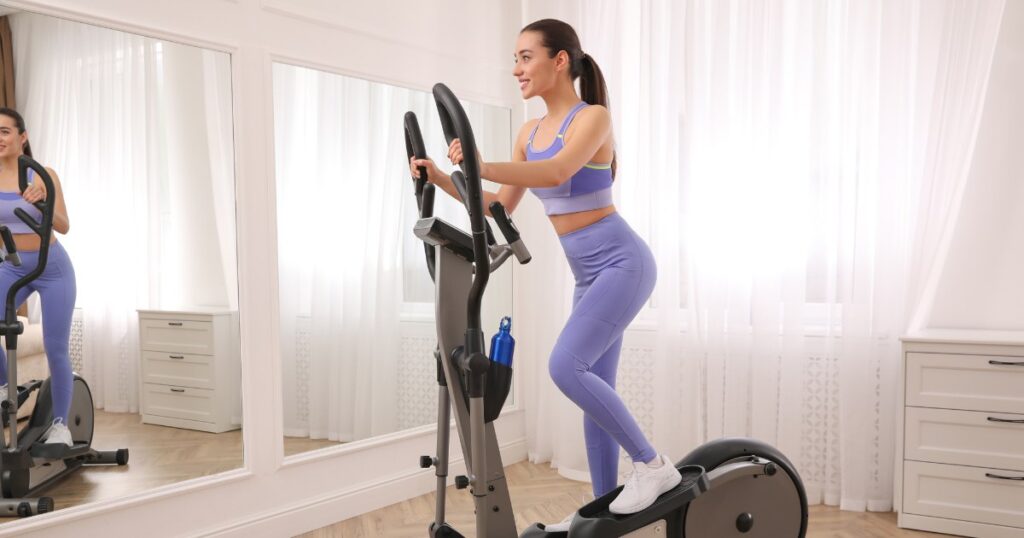
High-impact exercises like running, jumping, and heavy weightlifting are generally not recommended immediately post-Botox. Cardiovascular exercises that significantly elevate heart rate should also be avoided. The same goes for any activity that requires downward head movement, as this can cause Botox to migrate.
| Type of Exercise | Why to Avoid | Risk Level | Alternative Options | Resumption Timeline | Medical Clearance Required? |
| High-Impact Exercises | Can interfere with Botox settling | High | Low-impact cardio | 48+ hours | Recommended |
| Cardiovascular Workouts | Rapid blood flow affecting treatment | Moderate | Walking, light jogging | 48+ hours | Optional |
| Heavy Lifting | Straining and increased blood flow | High | Lightweights | 48+ hours | Recommended |
| Yoga Poses | Downward head movements | Moderate | Standing or seated poses | 24-48 hours | Optional |
| Swimming | Pressure changes in water | Moderate | Light water activities | 48+ hours | Optional |
| Competitive Sports | Rapid movements or potential for impact | High | Non-competitive play | 48+ hours | Recommended |
Consult Your Healthcare Provider: Tailoring Exercise Plans Based on Medical Advice
Your healthcare provider is the final authority on when you can resume exercise post-Botox. They can offer specific guidelines tailored to your health profile, treatment area, and type of Botox injection used. Failure to heed medical advice can compromise the treatment and lead to potential complications.
- Individualised Plans: Your healthcare provider can offer a customised exercise timeline.
- Type of Botox: Different formulations may require varying aftercare routines.
- Treatment Area: The location of the Botox injections could affect the permissible exercise type.
- Health Status: Pre-existing medical conditions may influence post-treatment care guidelines.
- Check-up Appointments: Follow-up visits can help assess your readiness for exercise.
- Trust the Experts: Always default to your healthcare provider’s recommendations when in doubt.
After Botox, following healthcare guidelines, especially regarding exercise, is vital to ensure optimal and long-lasting results.
Experience a new level of beauty with Dr Tarek Bayazid, Dubai’s esteemed plastic surgeon renowned for his artistry in facial rejuvenation and body contouring. With credentials from Belgrade University, rigorous training in Europe, and affiliations with elite institutions like ISAPS and MAFAC, Dr. Tarek embodies skill and sophistication. He is also renowned for his innovative ‘composite deep plane facelift’ and minimally invasive techniques, ensuring natural and safe results. Don’t just dream of perfection—book your consultation with Dr. Tarek Bayazid today and step into a world where beauty and excellence meet.



